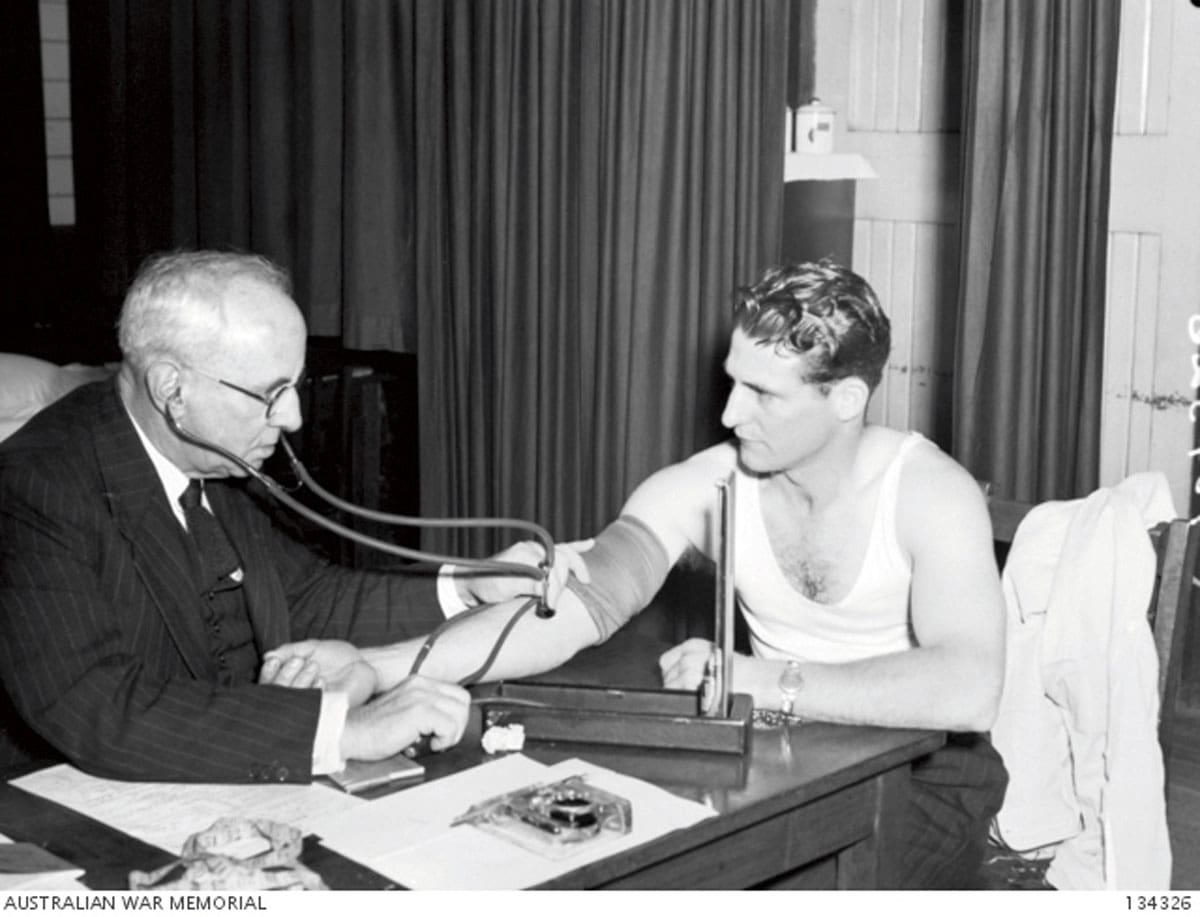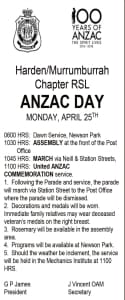Harden-born Kenneth Hutchinson undergoes a medical in August 1950, prior to his deployment with the 3rd Royal Australian Regiment in Korea. He was also a veteran of the Second World War.
When it comes to serving in the armed forces throughout the history of this country, the men and women of Harden-Murrumburrah, Binalong, Galong, Jugiong, Wombat, Binalong, Redbridge, Nubba, Cumbamurra and Cunningar have certainly punched above their weight. People from these towns and villages have put their hands up for the Boer War, First World War, Second World War, Korean War the Vietnam War as well as the more recent conflicts in Iraq and Afghanistan. Some have even served in multiple wars, such as Francis Clark in the First & Second World Wars, Mervyn Clark who served in the Royal Australian Navy (RAN) in the Second World War & Korean War, and more recently, Brad Giddings who served in both Iraq & Afghanistan.
But these conflicts to many of us are simply names. With each name there were years of events comprised of untold suffering as well as some more light-hearted moments. There would have been hours, if not days and weeks, of sheer boredom on ships, trains, horses and trucks. There would have been pure drudgery with a Corporal, Sergeant or Petty Officer giving you a dressing down because of a thread out of place or a speck of rust on a bayonet. Some may have turned right when ordered to turn left, reminiscent of poor old Corporal Jones from Dad’s Army. Whilst for some it may not have been an exciting experience, for others it was the opposite. For those serving in the Boer War, the incredible marksmanship of the Boer Kommandos in South Africa would have been in the mind of a Light Horseman riding through a valley in Natal, with the possibility of a Boer sniper hiding amongst the boulders up in the hills above him.
During the First World War, intense artillery barrages scarred both body and mind, but the intense periods of combat were sometimes tempered by pleasurable experiences. Such an example is that of Maurice Levy of Harden, who was court martialled in late 1918 for using an army car in what is now the Israeli town of Lod. Considering that he was Jewish, he used the chance to discover his ancestral homeland.
However, there was still the fear of gas. The devastating effects of gas on the Western Front was plain for all to see, causing intense blisters, blindness, bleeding in the lungs, and even death. The then Corporal Adolf Hitler was gassed on October 18, 1918, on the Ypres Salient in Belgium. There is a good reason he did not authorise the use of gas in combat during a war he would precipitate just two decades later. For those in the Second World War, the knowledge that a Japanese soldier could be less than three metres away in the thick jungles of New Guinea may well have been a constant thought. For a more contemporary perspective on that terrain, just ask Tim Davis and Bob Head. But not everyone’s experience of that conflict would have been the same. Some may have been flying in bombers above Germany, with anti-aircraft guns blasting away at them. Others may have been in the deserts of North Africa. The lucky ones could have been skiing in Lebanon and Syria preparing to defend against a Vichy French invasion that never came. In Korea, ‘the forgotten war’, many of this region’s sons were recalled to active service. One of those was the Harden-born Kenneth Hutchinson, who served in the Australian Army in 2/31 Australian Infantry Battalion in the Second World War, and with the 3rd Royal Australian Regiment (RAR) in Korea in 1950. 3RAR was the first Australian Army unit to be deployed in Korea after the Communist North invaded the South, pushing them out of Seoul and down to the port city of Pusan in June 1950. In September 1950, 3RAR joined the 27th Commonwealth Brigade, and were dropped behind enemy lines to rescue US prisoners of war. They then advanced north of Pyongyang, encountering stiff and numerically superior resistance before the Chinese entered the war in November 1950, with the Commonwealth Brigade providing the rear guard for retreating United Nations forces. This war was a clash of superpowers, with the US, United Kingdom & Commonwealth, and France facing off against Communist China and the Soviet Union. Both sides had nuclear weapons at their disposal, and considered using them, and men from this district were well amongst it all.
The next conflict was Vietnam, where the fear of the jungle experienced by those in New Guinea was perhaps experienced by their own sons, whether by lottery or by choice. Again, jungle warfare was complemented by the beautiful scenery and experiences away from the frontlines. Some of the airbases and operating bases that some people were deployed to from this area have now become holiday destinations, the memories of nerve-racking night time guard duty resonating during a massage session or a tailor-made suit fitting. The conflicts in Iraq and Afghanistan over the past 15 years have also brought the men and women of this region into the fray. Much like in Vietnam, the conventional warfare of the Iraq Invasion in March 2003 soon gave way to counter-insurgency operations, a pattern of activity replicated in the mountainous terrain of Afghanistan. There too, people from this town were deployed patrolling bazaars, commanding armoured vehicles or conducting raids on compounds. Although ANZAC Day commemorates the anniversary of the Gallipoli Landings on April 25th, 1915, Australians have been through so much more, our own towns and villages especially.
That is why, this ANZAC Day, we remember all those who fought from this area, whether by choice or by chance. Matthew Malone.


